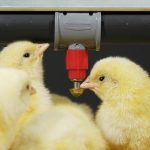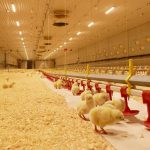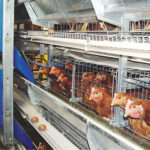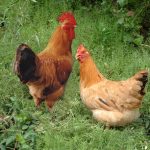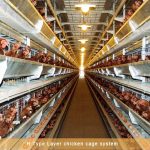Spring is the best time to raise chickens. With the rapid development of poultry breeding industry,poultry farming equipmenthas gradually become more and more automated, saving a lot of power for farmers. But in spring breeding poultry, we still have to pay attention to the following points:
1. Adjust the diet to ensure drinking water
After the beginning of the spring, the outside temperature gradually rose. When the temperature of the house rose to 15 °C, the chickens at the peak of egg production (23-40 weeks old), medium term (41-55 weeks old) and late (56-72 weeks old) Groups of eggs have an upward trend, but as the temperature increases, the feed intake of the flock will decrease. In order to ensure that the chickens are supplied with high quality, balanced nutrition and sufficient feed, the diet must be adjusted. In general, chickens with an egg production rate of 80% or more should have a protein content of 18% to 20% in the diet, and increase the amount of animal protein, vitamins and minerals added, such as calcium from 2% in winter. ~3% increased to 3.5%, phosphorus increased from 0.5% to 0.6%, and should be matched with good quality green fodder. If the egg weight of the flock is reduced and the egg production rate is decreased, it means that the protein content in the feed is insufficient, and it should be raised in a targeted manner; if the egg weight and egg production are basically stable, and the body weight is reduced, the energy level in the feed is low. It is necessary to increase the proportion of grains; if the appetite of the flock is reduced and there is indigestion, the salt content in the feed should be increased to 0.1%. For the flocks that are at the peak of laying, it is necessary to ensure adequate drinking water so as not to affect the performance of laying flocks.
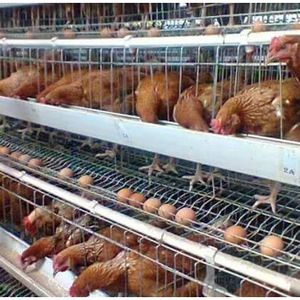
2. Strengthen sanitation and disinfection
Due to the large temperature difference between day and night in winter and spring, the resistance of chickens is generally weakened. Therefore, it is necessary to strengthen the sanitation and disinfection work, paying particular attention to the following points: the farm should be divided into net pollution to avoid cross-contamination; the drinking water system should be cleaned regularly. It is necessary to clear the manure in time, and prevent the feces from coming into contact with feed and drinking water; the chicken manure should be piled up at random, not dumped at will; the chicken house should be disinfected regularly, and the pest control and rodent prevention work should be done; after vaccination, it is necessary to drink water in time and do a good job on the ground. Disinfection; preventive drug administration on a regular or irregular basis according to actual conditions; pay attention to the health status of the chickens and find abnormalities, and immediately identify the causes and take corresponding measures in time.
3. Do a good job of immunization and deworming.
It is necessary to establish reasonable epidemic prevention procedures according to actual conditions and conduct regular epidemic prevention. When preventing parasitic diseases, you can add appropriate amounts of levamisole, avermectin and other drugs to the feed. At the same time, carefully observe the flocks, detect, isolate, diagnose and treat sick chickens early, and properly handle sick and dead chickens. Also, be careful to avoid stress on the flock.
In order to avoid the occurrence of external stress, it is necessary to regularly repair the equipment of the chicken house; in the event of stress, it is necessary to add electrolysis multi-dimensional relief in the drinking water in time. For diseases that are prone to winter and spring, such as Newcastle disease, Escherichia coli, slow call, rhinitis, etc., attention should be paid to the occurrence of the disease and surrounding epidemics, and timely immunization and drug prevention should be carried out to avoid economic losses caused by epidemic diseases.


